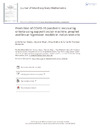Identificador persistente para citar o vincular este elemento:
https://accedacris.ulpgc.es/jspui/handle/10553/76419
| Título: | Prediction of COVID-19 pandemic measuring criteria using support vector machine, prophet and linear regression models in Indian scenario | Autores/as: | Gupta, Amit Kumar Singh, Vijander Mathur, Priya Travieso-González, Carlos M. |
Clasificación UNESCO: | 240401 Bioestadística | Palabras clave: | 68T01 Covid-19 Forecasting Linear Regression Model Machine Learning, et al. |
Fecha de publicación: | 2021 | Publicación seriada: | Journal of Interdisciplinary Mathematics | Resumen: | The whole world is embroiling the pandemic situation caused by COVID-19, which is spreading across all countries. As of mid-May, COVID-19 continues to increase the number of people affected and the number of deaths in each country. Each country’s administrations concerned are making endless efforts to maintain public health, mental health and to regulate the rate of illness of COVID-19. Analysis of COVID-19 data using the machine learning paradigm is becoming a major interest of the researcher in these situations. Several researchers analyzed data from COVID-19 to predict infection, death, cured persons in the future, which may lead to the planning of each country’s regulatory authority to maintain the public health of its people. The machine learning algorithm provides more accurate results when the data size is large due to the lower number of data sets available to COVID-19, making the most accurate predictions a challenging task to implement the machine learning algorithm. This paper was essentially designed to predict the active rate, the death rate, and the cured rate in India by analyzing the data of COVID-19. There are three models of machine learning Support Vector Machine (SVM), Prophet Forecasting Model, and Linear Regression Model for predicting active rate, death rate and cured rate. Prophet Forecasting Model has been shown to be the best predictive method for predicting active rate, death rate and cured rate compared to SVM and Linear Regression when the vast uncertain and small data sets. | URI: | https://accedacris.ulpgc.es/handle/10553/76419 | ISSN: | 0972-0502 | DOI: | 10.1080/09720502.2020.1833458 | Fuente: | Journal of Interdisciplinary Mathematics [ISSN 0972-0502], v. 24(1), p. 89-108 |
| Colección: | Artículos |
Citas SCOPUSTM
44
actualizado el 08-jun-2025
Citas de WEB OF SCIENCETM
Citations
34
actualizado el 08-feb-2026
Visitas
411
actualizado el 16-ene-2026
Descargas
865
actualizado el 16-ene-2026
Google ScholarTM
Verifica
Altmetric
Comparte
Exporta metadatos
Los elementos en ULPGC accedaCRIS están protegidos por derechos de autor con todos los derechos reservados, a menos que se indique lo contrario.
